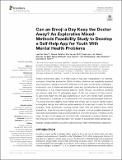Can an Emoji a Day Keep the Doctor Away? An Explorative Mixed-Methods Feasibility Study to Develop a Self-Help App for Youth With Mental Health Problems
Author(s)
Pentland, Alex; Reid, Todd G.
DownloadPublished version (1.181Mb)
Terms of use
Metadata
Show full item recordAbstract
Today’s smartphones allow for a wide range of “big data” measurement, for example, ecological momentary assessment (EMA), whereby behaviours are repeatedly assessed within a person’s natural environment. With this type of data, we can better understand – and predict – risk for behavioral and health issues and opportunities for (self-monitoring) interventions. In this mixed-methods feasibility study, through convenience sampling we collected data from 32 participants (aged 16–24) over a period of three months. To gain more insight into the app experiences of youth with mental health problems, we interviewed a subsample of 10 adolescents who received psycthological treatment. The results from this feasibility study indicate that emojis) can be used to identify positive and negative feelings, and individual pattern analyses of emojis may be useful for clinical purposes. While adolescents receiving mental health care are positive about future applications, these findings also highlight some caveats, such as possible drawback of inaccurate representation and incorrect predictions of emotional states. Therefore, at this stage, the app should always be combined with professional counseling. Results from this small pilot study warrant replication with studies of substantially larger sample size.
Date issued
2019-08Department
Massachusetts Institute of Technology. Media Laboratory; MIT Connection Science (Research institute)Journal
Frontiers in psychiatry
Publisher
Frontiers Media SA
Citation
Van Dam, Levi et al. “Can an Emoji a Day Keep the Doctor Away? An Explorative Mixed-Methods Feasibility Study to Develop a Self-Help App for Youth With Mental Health Problems.” Frontiers in psychiatry 10 (2019): 593 © 2019 The Author(s)
Version: Final published version
ISSN
1664-0640